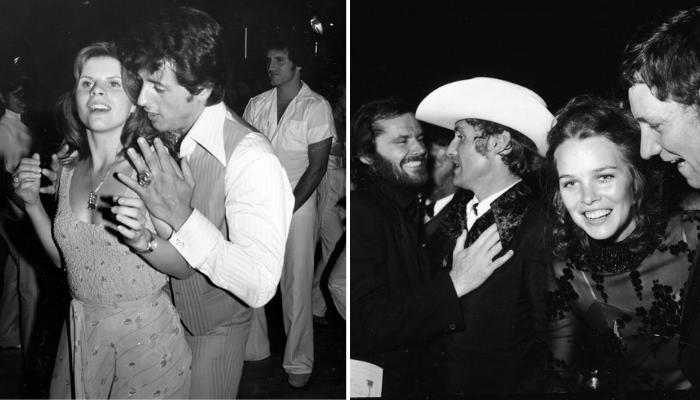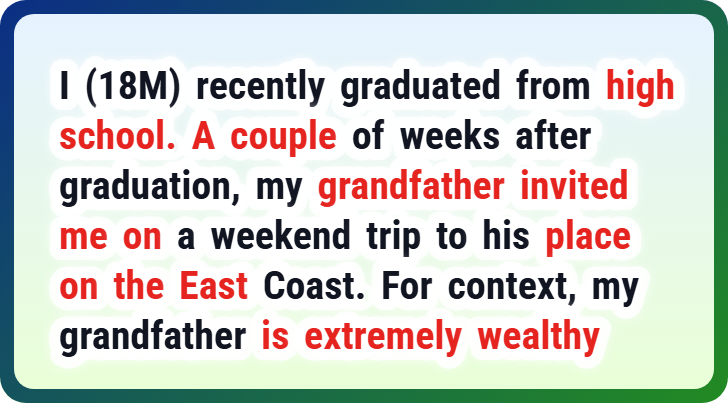My MIL Called My Cancer Support Post ‘Tacky’—Am I Wrong to Be Hurt?
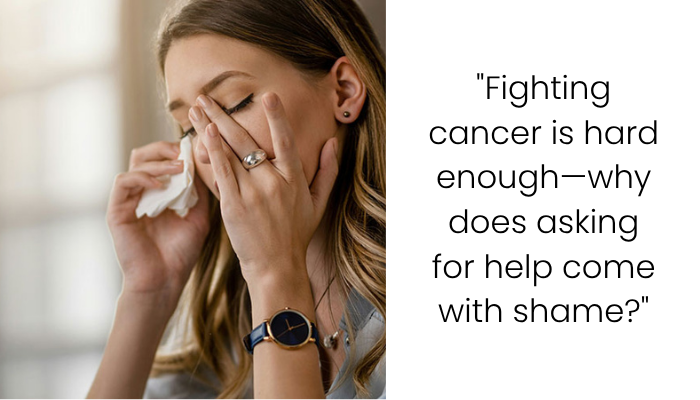
In this deeply emotional and vulnerable post, OP (37F) shares her recent cancer diagnosis and the complex emotional and logistical strain it has put on her and her young family. With treatment requiring extensive travel and recovery, a close friend offered to help by creating a Facebook post explaining that gas and food gift cards would be especially appreciated. The post was approved by OP, her sister, and her mother, and intended to facilitate support from people who genuinely wanted to help.
However, the situation took a painful turn when OP’s mother-in-law (MIL) saw the post and took offense. She labeled it “tacky” and “dramatic,” messaged both OP and her husband to express her disapproval, and even went so far as to confront the friend directly. Although MIL has provided prior financial support, OP feels her reaction was more about control and maintaining a certain image rather than real concern. Torn between gratitude and hurt, OP asked her friend to take the post down to avoid further conflict—only to feel complicit in silencing a meaningful gesture of help.
Advertisement – Continue Reading Below
A cancer patient asked for help from friends online, and was told it’s too ‘tacky’ and ‘dramatic’ by her MIL

Advertisement – Continue Reading Below
The mother-in-law thought it was shameful to ask people for financial help like that

Advertisement – Continue Reading Below

Advertisement – Continue Reading Below

Advertisement – Continue Reading Below

Advertisement – Continue Reading Below

Advertisement – Continue Reading Below

Advertisement – Continue Reading Below

Advertisement – Continue Reading Below

Advertisement – Continue Reading Below
Receiving a cancer diagnosis is not just a medical event—it’s a psychological, emotional, and logistical earthquake. For patients and their families, the burdens multiply: treatment plans, insurance battles, childcare needs, and financial disruptions all collide at once. Against this backdrop, support networks often become lifelines. In OP’s story, the friction lies not in the absence of help, but in how help is solicited—and what it reveals about power, image, and family dynamics.
🩺 The Cost of Cancer and the Reality of Asking for Help
According to the American Cancer Society, cancer patients in the U.S. face average out-of-pocket expenses ranging from $5,000 to $10,000 annually, even with insurance. These costs include travel, lodging, childcare, meal planning, and lost wages—particularly acute for those, like OP, who are undergoing intensive treatments far from home.
Crowdfunding platforms like GoFundMe, as well as informal asks via social media, have become common and culturally accepted ways to fill these gaps. One 2018 study from the Journal of Medical Internet Research noted that over 41% of cancer patients surveyed used online fundraising tools to offset costs and found them emotionally validating as well as financially helpful.
Given this context, OP’s friend’s gesture was not only well-intentioned but also socially and practically appropriate. Asking for gas cards and food gift cards is a direct, low-barrier form of support that doesn’t require the giver to commit to large financial donations and often comes from those who feel powerless watching a loved one go through something hard.

Advertisement – Continue Reading Below
🧓 MIL Dynamics: Generosity or Gatekeeping?
The most telling line in this story is the MIL’s statement: “This is not the [FAMILY NAME] way.” That phrase implies a deeper value system—one where maintaining appearances, avoiding public vulnerability, or handling issues “internally” trumps open expressions of need.
While her prior financial support is undeniably generous, MIL’s objection to the public nature of the Facebook post suggests the issue isn’t about the ask itself, but about who gets to control the narrative of the family’s hardship. This is a textbook case of what family therapists refer to as instrumental support vs. emotional control.
Advertisement – Continue Reading Below
MIL’s intervention—contacting the friend, texting her son, and framing the post as a betrayal of family values—shifts the focus away from the patient’s wellbeing and toward family image management. This shift can be especially damaging when the person undergoing treatment is already struggling to hold on to autonomy and dignity.
It’s important to recognize that financial generosity does not grant someone veto power over how others express support. In fact, insisting on such control can create a toxic support dynamic, one where gifts are given with invisible strings attached.
🧠 Silencing and the Psychology of Control
OP’s feeling of “giving her MIL exactly what she wanted—control and silence” is not just a gut reaction; it’s rooted in well-documented psychological effects. In caregiving and support settings, research shows that perceived control over one’s own situation is crucial to emotional resilience. When that control is undermined—even by well-meaning relatives—the patient can experience feelings of guilt, shame, and emotional fatigue.
A 2016 paper in The Journal of Health Psychology found that cancer patients who felt constrained in their communication—either by trying not to upset others or by being told how they “should” behave—had significantly higher levels of stress and depressive symptoms. Being told that their coping mechanisms are “dramatic” or “tacky” undermines both emotional expression and community care.
OP’s decision to take down the post may have been driven by a desire to “keep the peace,” but the emotional toll of appeasement during illness should not be underestimated. The desire to avoid conflict is valid—but so is the right to be supported in ways that feel genuine and helpful.
Advertisement – Continue Reading Below

Advertisement – Continue Reading Below
📱 Reposting or Reframing: A Middle Ground?
So should OP ask her friend to repost the message?
There’s no one-size-fits-all answer, but several routes offer a balanced approach:
- Reposting with Adjustments: If OP is still comfortable with the idea, the message could be reframed as a “community update” that highlights gratitude for existing support and gently suggests ways others can help. Example: “So many people have asked how to help, and we’re incredibly grateful for all the kindness. For those who’ve asked, small things like gas cards or meal support for the kids during treatment weeks mean the world. Thank you for walking this road with us.”
- Creating a Private Group or Registry: Some families create private Facebook groups, MealTrains, or Amazon wishlists where only invited members can view or contribute. This may feel more controlled without erasing the support entirely.
- Direct Conversation with MIL: If OP has the bandwidth, a calm, assertive conversation with MIL could clarify boundaries. Acknowledging MIL’s past help while gently explaining that others also want to help might ease the tension. Example: “We’re deeply grateful for all you’ve done—and I hope you can also understand that others who care about us want to feel useful too. It wasn’t meant to offend, just to give them an easy way to show love.”
- Empowering the Friend: Reaffirming that her friend did nothing wrong and encouraging her support in other ways can reinforce OP’s agency—even if the post stays down.
But most commenters sided with the patient: “She is not the arbiter of what is or is not the way”

Advertisement – Continue Reading Below
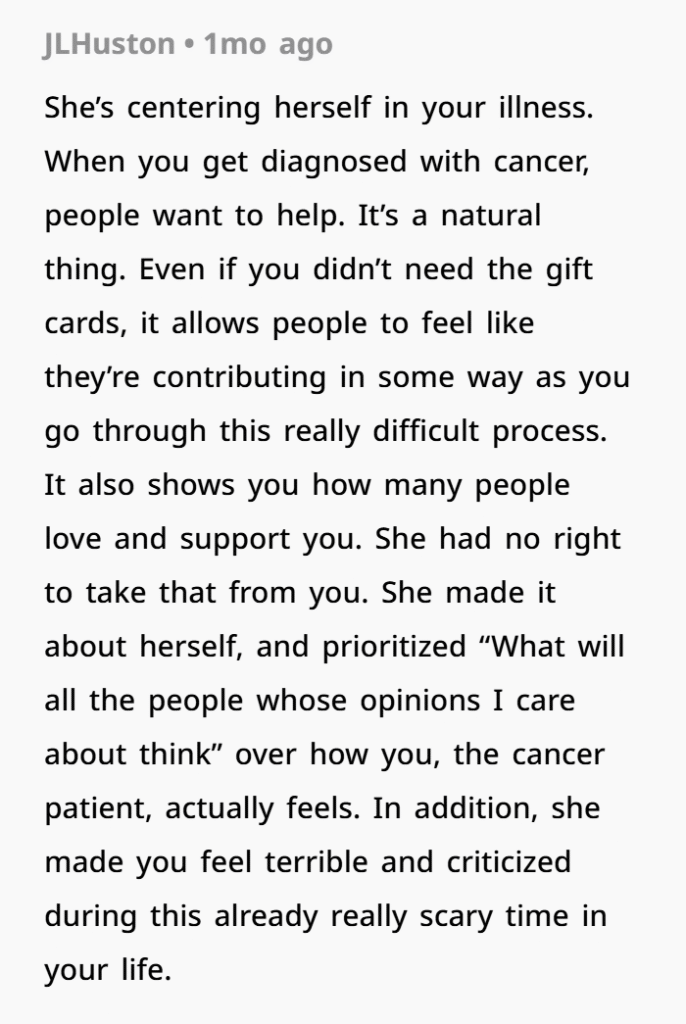
Advertisement – Continue Reading Below

Advertisement – Continue Reading Below

Advertisement – Continue Reading Below
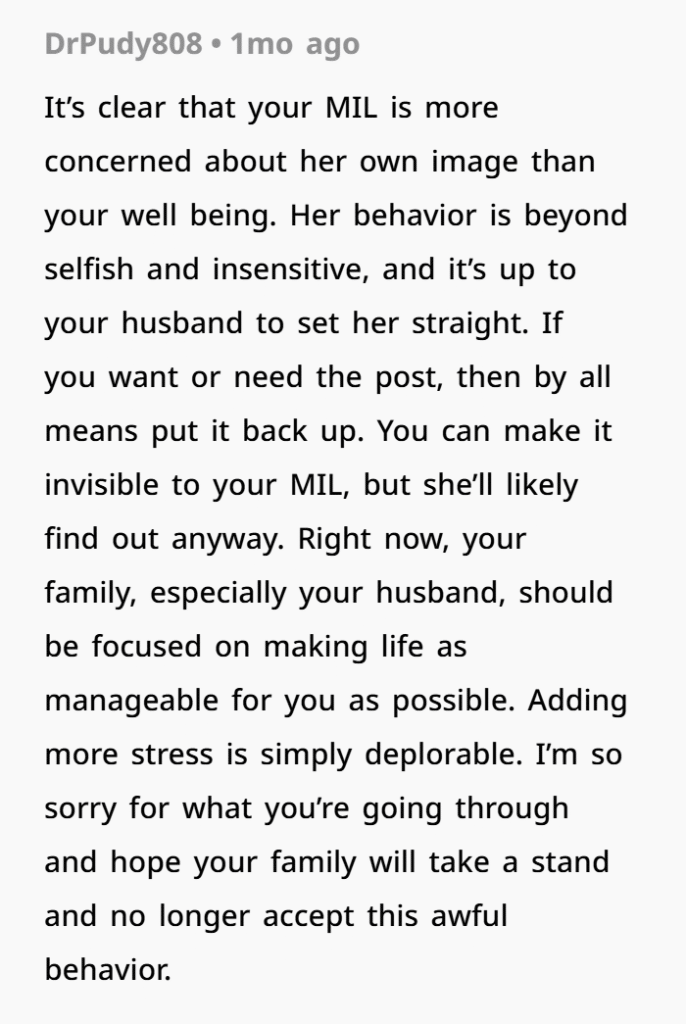
Advertisement – Continue Reading Below
Is OP the asshole? Absolutely not. She’s a woman facing an overwhelming health crisis, trying to navigate support systems and family politics at the same time. Her MIL’s generosity is real, but so is her overstep. There’s a clear difference between helping someone and managing them.
Advertisement – Continue Reading Below
This situation is not about tackiness or drama—it’s about visibility, vulnerability, and the difficult, often invisible, emotional labor that comes with serious illness. OP has the right to choose the kind of help she receives and the voice with which she accepts it.


